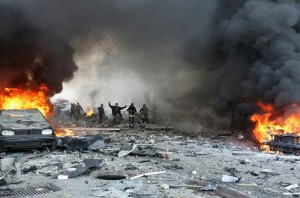 The BBC has suddenly pulled a documentary film series about the assassination of the former Lebanese prime minister Rafiq al-Hariri as tensions mount in Beirut over expectations that Hezbollah operatives are about to be accused of involvement in the killing.
The BBC has suddenly pulled a documentary film series about the assassination of the former Lebanese prime minister Rafiq al-Hariri as tensions mount in Beirut over expectations that Hezbollah operatives are about to be accused of involvement in the killing.
The first of three parts of Murder in Beirut was scheduled to be broadcast on BBC World this Saturday, but the producer was told without warning on Tuesday that it was being delayed.
The BBC said the film had not yet complied with its editorial guidelines. No new date has been set. But the decision to postpone it was taken after a Lebanese newspaper described how it accused the militant Shia group of the 2005 assassination, in which Hariri and 22 others were killed by a massive car bomb.
The point of the film, al-Akhbar claimed in a front-page article on Monday, was “to implicate Hezbollah in the crime”, with one image showing partial details of a man described as a former member of the organisation’s foreign operations unit. Today extracts were broadcast on al-Jadeed TV, a pro-Syrian channel.
Tension has mounted sharply in Lebanon in recent weeks amid expectations that a UN-backed international tribunal will shortly issue indictments in the case, the country’s equivalent of the Kennedy assassination. Hezbollah’s leader, Hassan Nasrallah, warned last week that he would “cut off the hand” of anyone who tried to arrest its members. Hezbollah, the most powerful military and political force in Lebanon, is supported by Iran and Syria and has repeatedly accused the tribunal of serving US and Israeli interests.
Sa’ad Hariri, the dead man’s son and current prime minister, has insisted that he, Nasrallah and other leaders will not let Lebanon “explode” over the issue.
The series was made by ORTV, a British-Saudi production company, and originally commissioned by al-Arabiyya TV, the Saudi-owned satellite channel. The first version was completed last summer but never broadcast as Saudi Arabia sought to improve relations with Syria. BBC World then commissioned a re-edited version.
Initially Syria was widely blamed for the killing but it has become clear in recent months that Hezbollah is suspected of involvement, fuelling fears that Lebanon’s rivalries will escalate dangerously if indictments are issued.
The tribunal, based in a suburb of The Hague, began work in March 2009. In a new twist, Lebanese media reported that Alireza Asghari, a former Iranian revolutionary guard general who defected to the US, provided information about the role of Hezbollah’s Imad Mughniyeh, who was assassinated in Damascus in 2008.
The films include interviews with decision-makers in Beirut, Damascus, Washington and Paris, promising to tell “the gripping inside story of what’s really at stake in the struggle for power in the Middle East”. The BBC has not been warned specifically not to screen the series, but insiders admit there is nervousness about its impact in the current volatile climate.
Nadim Shehadi, a Lebanon expert at the Chatham House thinktank in London, said: “There is an atmosphere of terror in Beirut. It may be a deliberate campaign to apply pressure to the tribunal. It is almost as if there is a communications strategy.”
The producer, Christopher Mitchell, told the Guardian: “It is true that the film’s transmission has suddenly been postponed. I am assured by the BBC that the series hasn’t been dropped. Stories about the Middle East are … highly sensitive and go through a lengthy period of fact-checking and approval. I hope it will appear in the near future. Was this justified? I don’t yet know, though I understand the sensitivities involved. Murder in Beirut tackles a difficult subject and everybody on the production worked hard to make sure it was as fair and accurate as possible. Naturally we are very disappointed that the broadcast has been delayed.”
A BBC spokesman said: “All programmes shown by BBC World News must comply with the BBC’s editorial guidelines. This applies equally to programmes we commission from the BBC, independents or, in this case, bought-in programmes. From time to time, the compliance process requires more time to complete. This can affect scheduling. This series of programmes falls into this category.”
Rafiq Hariri was a billionaire businessman who served twice as Lebanese prime minister and helped rebuild central Beirut after the ravages of the civil war. A Sunni Muslim who was backed by Saudi Arabia, and a close friend of France’s Jacques Chirac, he fell victim to divisions about Syrian influence in Lebanon. But his murder on 14 February 2005 triggered mass protests and international pressure that led to the removal of Syrian forces after nearly 30 years. Syria’s president, Bashar al-Assad, has always denied any involvement and the focus recently has been on the possible involvement in the killing of Hezbollah, part of Lebanon’s parliamentary opposition as well as a powerful militia which is credited with leading resistance to Israel since the 1982 invasion. General Gabi Ashkenazi, the Israeli army chief of staff, said this week that if the tribunal were to indict Hezbollah members it would probably lead to a coup d’état. Guardian

Leave a Reply
You must be logged in to post a comment.